2016年九年级U11知识点
九年级英语全一册unit11知识点汇总
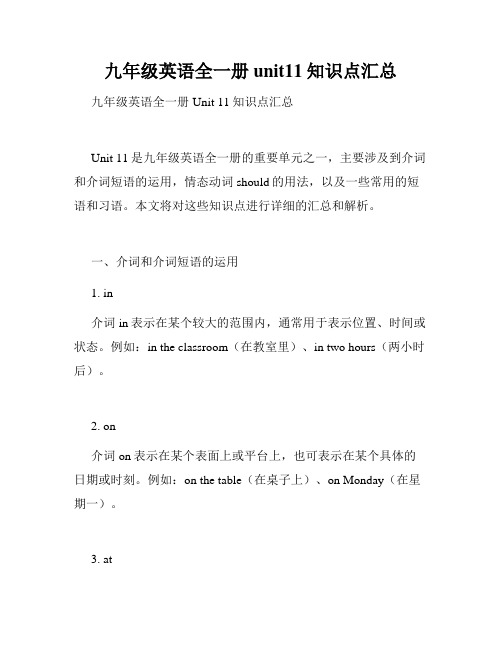
九年级英语全一册unit11知识点汇总九年级英语全一册Unit 11知识点汇总Unit 11是九年级英语全一册的重要单元之一,主要涉及到介词和介词短语的运用,情态动词should的用法,以及一些常用的短语和习语。
本文将对这些知识点进行详细的汇总和解析。
一、介词和介词短语的运用1. in介词in表示在某个较大的范围内,通常用于表示位置、时间或状态。
例如:in the classroom(在教室里)、in two hours(两小时后)。
2. on介词on表示在某个表面上或平台上,也可表示在某个具体的日期或时刻。
例如:on the table(在桌子上)、on Monday(在星期一)。
3. at介词at表示在某个地点或某个具体的时间点上。
例如:at the bus stop(在公交车站)、at 9 o'clock(在9点)。
4. by介词by表示通过某种方式或手段,也可表示在某个时间之前。
例如:by bus(乘坐公交车)、by tomorrow(到明天为止)。
介词和介词短语的运用在语言学习中非常重要,正确的使用可以增强句子的表达能力和准确性。
二、情态动词should的用法情态动词should表示建议、劝告、命令或期望,常用于祈使句或陈述句中。
例如:You should study harder.(你应该更加努力学习。
)should的否定形式为should not或shouldn't,表示禁止或不应该做某事。
例如:You shouldn't eat too much junk food.(你不应该吃太多垃圾食品。
)应用should不仅能够增强表达的明确性,还能够使语言更加礼貌和客观。
三、常用短语和习语1. make sure这个短语的意思是确保某事,常用于保证某件事情发生或不发生。
例如:Make sure to bring your passport when you travel abroad.(出国旅行时确保携带护照。
九年级英语unit 11 知识点
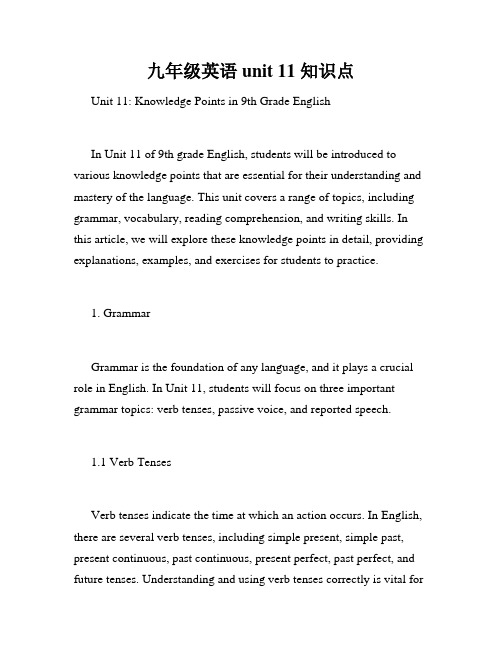
九年级英语unit 11 知识点Unit 11: Knowledge Points in 9th Grade EnglishIn Unit 11 of 9th grade English, students will be introduced to various knowledge points that are essential for their understanding and mastery of the language. This unit covers a range of topics, including grammar, vocabulary, reading comprehension, and writing skills. In this article, we will explore these knowledge points in detail, providing explanations, examples, and exercises for students to practice.1. GrammarGrammar is the foundation of any language, and it plays a crucial role in English. In Unit 11, students will focus on three important grammar topics: verb tenses, passive voice, and reported speech.1.1 Verb TensesVerb tenses indicate the time at which an action occurs. In English, there are several verb tenses, including simple present, simple past, present continuous, past continuous, present perfect, past perfect, and future tenses. Understanding and using verb tenses correctly is vital foreffective communication and comprehension. Let's look at some examples:- Simple Present: "She plays basketball every Saturday."- Simple Past: "I watched a movie last night."- Present Continuous: "They are studying for their exams."- Past Continuous: "We were playing soccer when it started raining."- Present Perfect: "He has visited three different countries."- Past Perfect: "She had already finished her homework before dinner."- Future Tense: "We will go on a trip next week."Throughout this unit, students will learn how to form and use different verb tenses in context through exercises and practice activities.1.2 Passive VoiceThe passive voice is used when the subject of a sentence is the receiver of an action rather than the doer. It is formed using a form of the verb "to be" plus the past participle of the main verb. Example:- Active Voice: "She wrote the novel."- Passive Voice: "The novel was written by her."Understanding when and how to use the passive voice is essential for clear and effective communication. Students will practice transforming active sentences into passive ones and vice versa.1.3 Reported SpeechReported speech is used to convey what someone said in the past. It involves a change in verb tense and pronouns. For example:- Direct Speech: "He said, 'I am going to the party.'"- Reported Speech: "He said he was going to the party."Students will learn the rules and practice transforming direct speech into reported speech.2. VocabularyUnit 11 introduces a variety of vocabulary related to different topics, such as sports, health, and education. Students will learn new words, their meanings, and how to use them in context. Vocabulary exercises and activities will help reinforce their understanding and application of these words.3. Reading ComprehensionReading comprehension plays a crucial role in language learning. In Unit 11, students will be exposed to various reading passages, such as newspaper articles, short stories, or biographies. They will practice reading for gist, scanning for specific information, and understanding implied meanings. Comprehension questions and activities will be provided to assess their understanding and encourage critical thinking.4. Writing SkillsWriting skills are necessary for effective communication. Unit 11 focuses on different types of writing, such as informal letters, persuasive essays, or descriptive paragraphs. Students will learn how to structure their writing, use appropriate language, and convey their ideas clearly. Writing prompts and guidelines will be given to guide their practice and improvement.ConclusionUnit 11 of 9th grade English covers essential knowledge points in grammar, vocabulary, reading comprehension, and writing skills. By mastering these topics, students can enhance their understanding, fluency, and proficiency in the English language. Regular practice, exercises, and activities will support their learning journey and ensure their success in communication and comprehension.。
九年级英语unit11知识点
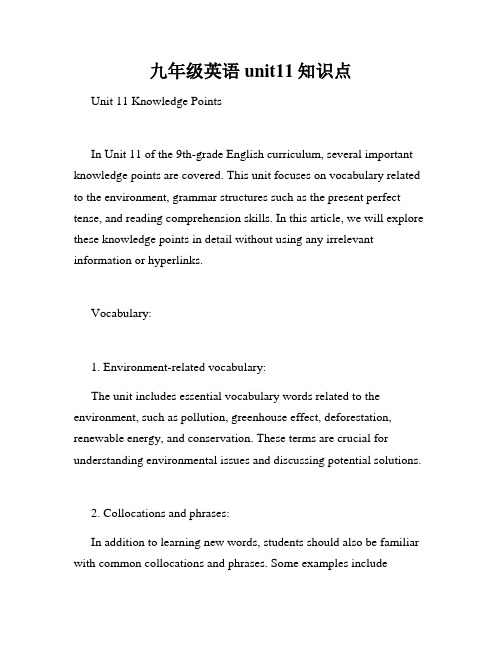
九年级英语unit11知识点Unit 11 Knowledge PointsIn Unit 11 of the 9th-grade English curriculum, several important knowledge points are covered. This unit focuses on vocabulary related to the environment, grammar structures such as the present perfect tense, and reading comprehension skills. In this article, we will explore these knowledge points in detail without using any irrelevant information or hyperlinks.Vocabulary:1. Environment-related vocabulary:The unit includes essential vocabulary words related to the environment, such as pollution, greenhouse effect, deforestation, renewable energy, and conservation. These terms are crucial for understanding environmental issues and discussing potential solutions.2. Collocations and phrases:In addition to learning new words, students should also be familiar with common collocations and phrases. Some examples includeenvironmental protection, carbon footprint, reduce waste, global warming, sustainable development, and alternative energy sources.Grammar:1. Present perfect tense:The present perfect tense is a fundamental grammar structure covered in Unit 11. It is formed by using the auxiliary verb "have/has" and the past participle of the main verb. This tense is used to connect the past and present, emphasizing the result or consequence of past actions. For example, "I have seen the movie" and "She has already finished her homework."2. Present perfect vs. past simple:A crucial aspect of the present perfect tense is understanding its distinction from the past simple tense. While the present perfect focuses on the experience and the impact on the present, the past simple indicates an action completed at a specific time in the past. For example, "I have been to France" (present perfect) vs. "I went to France last summer" (past simple).Reading Comprehension:1. Skimming and scanning:When reading texts in the English language, proficient comprehension skills are essential. Skimming is a technique used to quickly identify the main idea or topic of a passage, while scanning helps to locate specific information or key details. Developing these skills can significantly enhance reading comprehension.2. Context clues:Understanding context clues is crucial for grasping the meaning of unfamiliar words. By paying attention to surrounding words, expressions, or sentence structure, students can infer the meaning of unknown vocabulary without relying solely on a dictionary.In conclusion, Unit 11 of the 9th-grade English curriculum focuses on vocabulary related to the environment, the present perfect tense, and reading comprehension skills. Mastering these knowledge points will enable students to communicate effectively, understand environmental issues, and improve their overall language proficiency. By dedicating time and effort to learning and practicing these concepts, students can enhance their English language skills and become more confident communicators.。
九年级第十一章知识点
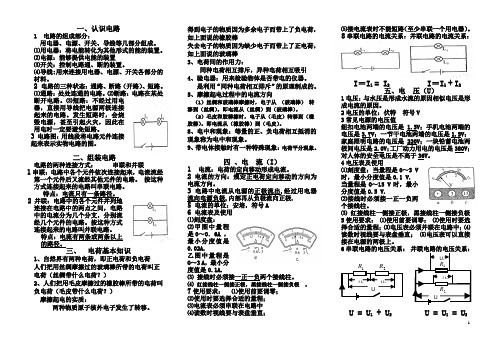
一、认识电路1 电路的组成部分:用电器、电源、开关、导线等几部分组成。
⑴用电器:将电能转化为其他形式的能的装置。
⑵电源:能够提供电能的装置⑶开关:控制电路通、断的装置。
⑷导线:用来连接用电器、电源、开关各部分的材料。
2 电路的三种状态:通路、断路(开路)、短路。
⑴通路:处处连通的电路。
⑵断路:电路在某处断开电路。
⑶短路:不经过用电器,直接用导线把电源两极连接起来的电路。
发生短路时,会烧毁电源,甚至引起火灾,因此在用电时一定要避免短路。
3电路图:用线段将电路元件连接起来表示实物电路的图。
二、组装电路电路的两种连接方式:串联和并联1串联:电路中各个元件依次连接起来,电流流经第一个元件后又流经其他元件的电路。
按这种方式连接起来的电路叫串联电路。
特点:电流只有一条路径。
2并联:电路中的各个元件并列地连接在电路中的两点之间,电路中的电流分为几个分支,分别流经几个元件的电路。
按这种方式连接起来的电路叫并联电路。
特点:电流有两条或两条以上的路径。
三、电荷基本知识1、自然界有两种电荷,即正电荷和负电荷人们把用丝绸摩擦过的玻璃棒所带的电荷叫正电荷(丝绸带什么电荷?)2、人们把用毛皮摩擦过的橡胶棒所带的电荷叫负电荷(毛皮带什么电荷?)摩擦起电的实质:两种物质原子核外电子发生了转移。
得到电子的物质因为多余电子而带上了负电荷,如上面说的橡胶棒失去电子的物质因为缺少电子而带上了正电荷,如上面说的玻璃棒3、电荷间的作用力:同种电荷相互排斥,异种电荷相互吸引4、验电器:用来检验物体是否带电的仪器。
是利用“同种电荷相互排斥”的原理制成的。
5、摩擦起电过程中的电流方向(1)丝绸和玻璃棒摩擦时,电子从(玻璃棒)转移到(丝绸)。
即电流从(丝绸)到(玻璃棒)。
(2)毛皮和胶棒擦时,电子从(毛皮)转移到(橡胶棒)。
即电流从(橡胶棒)到(毛皮)。
8、电中和现象:等量的正、负电荷相互抵消的现象称为电中和现象。
9、带电体接触时有一种特殊现象:电荷平分现象。
Unit11九年级知识点
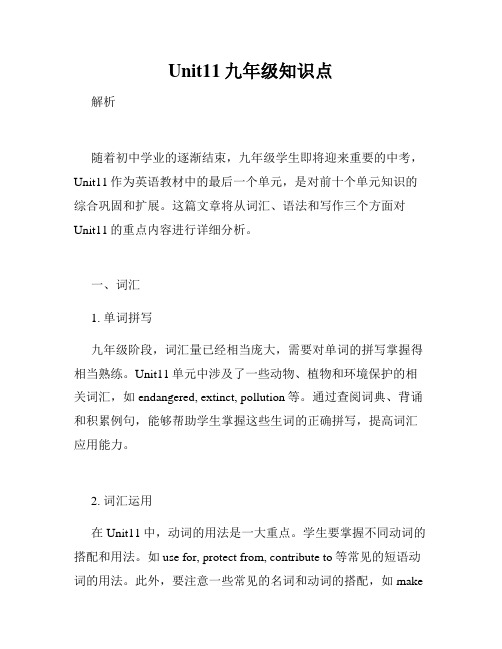
Unit11九年级知识点解析随着初中学业的逐渐结束,九年级学生即将迎来重要的中考,Unit11作为英语教材中的最后一个单元,是对前十个单元知识的综合巩固和扩展。
这篇文章将从词汇、语法和写作三个方面对Unit11的重点内容进行详细分析。
一、词汇1. 单词拼写九年级阶段,词汇量已经相当庞大,需要对单词的拼写掌握得相当熟练。
Unit11单元中涉及了一些动物、植物和环境保护的相关词汇,如endangered, extinct, pollution等。
通过查阅词典、背诵和积累例句,能够帮助学生掌握这些生词的正确拼写,提高词汇应用能力。
2. 词汇运用在Unit11中,动词的用法是一大重点。
学生要掌握不同动词的搭配和用法。
如use for, protect from, contribute to等常见的短语动词的用法。
此外,要注意一些常见的名词和动词的搭配,如makea difference, take action等,通过做词汇练习和句型转换,能够帮助学生熟练掌握这些词汇的用法。
二、语法在Unit11中,语法知识主要涉及虚拟语气和形容词和副词的比较级和最高级。
1. 虚拟语气虚拟语气是英语中的一个难点,也是九年级语法中的一大重点。
在Unit11中,出现了一些虚拟语气的用法,如表示建议、要求、命令、愿望和怀疑等。
学生要能够通过练习和阅读理解等方式,掌握虚拟语气的基本用法和句型结构。
2. 形容词和副词的比较级和最高级形容词和副词的比较级和最高级是英语语法中的基础知识点,也是九年级考试中的重点内容。
在Unit11中,涉及了一些比较级和最高级的用法,如形容词的比较级和最高级用于进行比较,副词的比较级和最高级用于描述程度。
学生要通过练习和背诵,熟练掌握这些用法,运用到写作和阅读理解中。
三、写作写作是英语学习中一个重要的方面,也是要求学生能够综合运用语法和词汇知识的能力。
在Unit11中,写作要求学生能够描述自己的环保行动,并给出一些建议。
九年级unit11知识点讲义
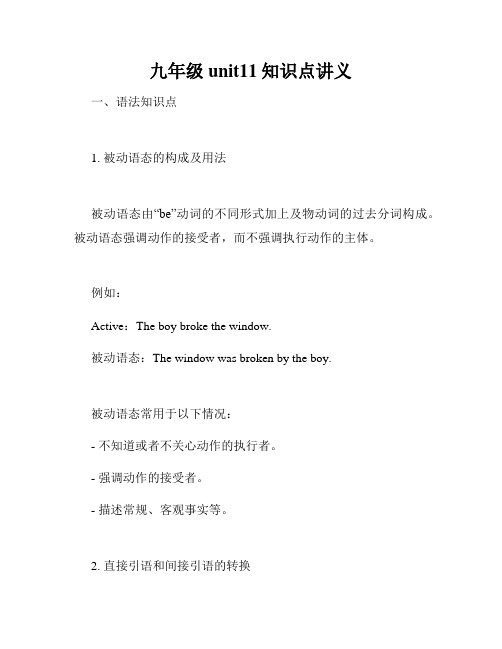
九年级unit11知识点讲义一、语法知识点1. 被动语态的构成及用法被动语态由“be”动词的不同形式加上及物动词的过去分词构成。
被动语态强调动作的接受者,而不强调执行动作的主体。
例如:Active:The boy broke the window.被动语态:The window was broken by the boy.被动语态常用于以下情况:- 不知道或者不关心动作的执行者。
- 强调动作的接受者。
- 描述常规、客观事实等。
2. 直接引语和间接引语的转换直接引语是直接引述他人说的话,直接使用他人的原话;间接引语是用自己的话转述他人的原话。
例如:直接引语:Mary said, "I am going to the party."间接引语:Mary said that she was going to the party.转换注意事项:- 动词时态、人称、时间等要做相应的变化。
- 引述人称代词、指示代词等要与原话上下文保持一致。
- 可能要调整引述的时间状语和地点状语。
3. 过去完成时的构成及用法过去完成时用于描述在过去某个时间或动作发生之前已经完成的动作,常与过去时连用。
构成:had + 过去分词例如:We had already finished the project when he arrived.过去完成时可以通过词汇上的提示,如“by the time”、“before”、“already”等来判断使用时态。
二、词汇知识点1. 表示因果关系的连接词表示因果关系的连接词有:because、as、since、for等。
- because常用于句首或句中,连接原因和结果。
- as和since都表示原因,连接原因和结果;as也可以表示时间或方式。
- for常用于句首,用来说明原因。
例如:- I couldn't go to the party because I was sick.- As it was raining, we decided to stay at home.- He failed the exam, for he hadn't studied enough.2. 表示时间的连接词表示时间的连接词有:when、while、as、before、after、until 等。
人教版英语九年级全册Unit11单元重点知识和短语梳理讲解
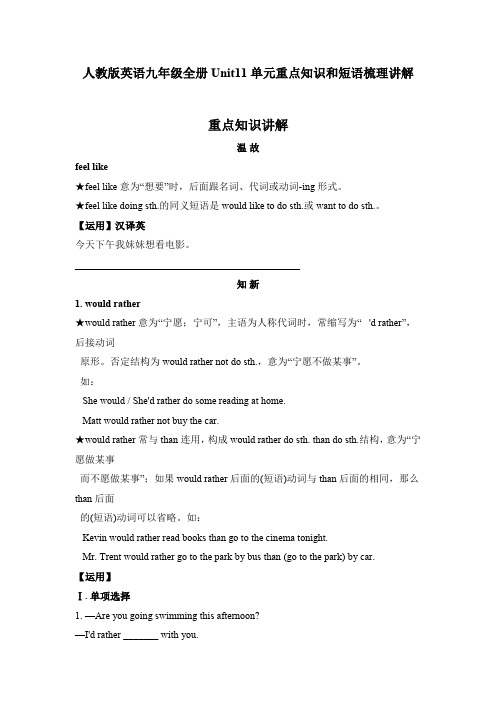
人教版英语九年级全册Unit11单元重点知识和短语梳理讲解重点知识讲解温故feel like★feel like意为“想要”时,后面跟名词、代词或动词-ing形式。
★feel like doing sth.的同义短语是would like to do sth.或want to do sth.。
【运用】汉译英今天下午我妹妹想看电影。
_____________________________________________知新1. would rather★would rather 意为“宁愿;宁可”,主语为人称代词时,常缩写为“'d rather”,后接动词原形。
否定结构为would rather not do sth.,意为“宁愿不做某事”。
如:She would / She'd rather do some reading at home.Matt would rather not buy the car.★would rather常与than连用,构成would rather do sth. than do sth.结构,意为“宁愿做某事而不愿做某事”;如果would rather后面的(短语)动词与than后面的相同,那么than 后面的(短语)动词可以省略。
如:Kevin would rather read books than go to the cinema tonight.Mr. Trent would rather go to the park by bus than (go to the park) by car.【运用】Ⅰ. 单项选择1. —Are you going swimming this afternoon?—I'd rather _______ with you.A. to go shoppingB. go shopingC. to go shopingD. go shopping(2016 甘肃兰州)2. His uncle would rather _______ in the countryside than _______ to the city.A. stay; movingB. to stay; moveC. stay; moveD. to stay; to move(2015 山东烟台) Ⅱ. 汉译英1. 本(Ben)宁愿不搬到一所更大的房子里。
九年级英语unit11全单元课文主要概念详细分析
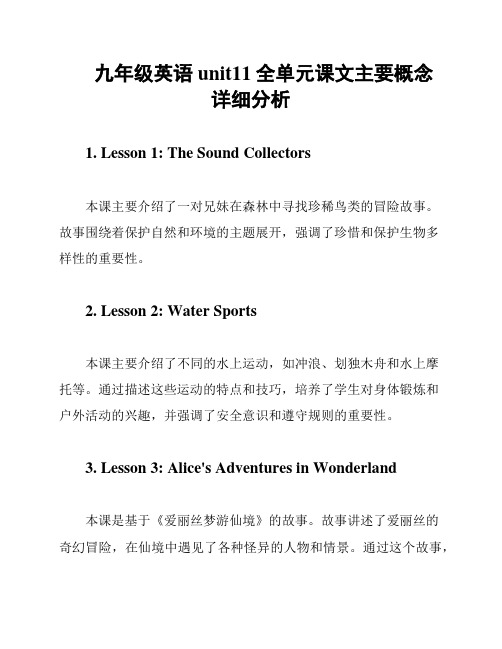
九年级英语unit11全单元课文主要概念详细分析1. Lesson 1: The Sound Collectors本课主要介绍了一对兄妹在森林中寻找珍稀鸟类的冒险故事。
故事围绕着保护自然和环境的主题展开,强调了珍惜和保护生物多样性的重要性。
2. Lesson 2: Water Sports本课主要介绍了不同的水上运动,如冲浪、划独木舟和水上摩托等。
通过描述这些运动的特点和技巧,培养了学生对身体锻炼和户外活动的兴趣,并强调了安全意识和遵守规则的重要性。
3. Lesson 3: Alice's Adventures in Wonderland本课是基于《爱丽丝梦游仙境》的故事。
故事讲述了爱丽丝的奇幻冒险,在仙境中遇见了各种怪异的人物和情景。
通过这个故事,学生能够体验奇幻的想象力和创造力,并思考现实世界和幻想世界之间的差异。
4. Lesson 4: Space Tourism本课主要介绍了太空旅游的概念,探讨了人类是否可以在将来去太空旅行。
通过讨论太空旅游的利与弊,引导学生思考科技发展对未来的影响以及人类的探索精神。
5. Lesson 5: Myths and Legends本课主要介绍了一些神话和传说的故事,如妈祖和希腊神话等。
通过了解这些传统故事,学生可以加深对不同文化的理解,并从中汲取智慧和启示。
6. Lesson 6: The Writer's Craft本课主要介绍了写作的技巧和方法。
通过分析写作中的元素和技巧,培养学生的写作能力和创造力,并使他们能够更好地表达自己的想法和情感。
以上是九年级英语unit11全单元课文的主要概念详细分析。
每节课都涉及了不同的主题和故事,旨在提高学生的语言能力和对世界的理解。
- 1、下载文档前请自行甄别文档内容的完整性,平台不提供额外的编辑、内容补充、找答案等附加服务。
- 2、"仅部分预览"的文档,不可在线预览部分如存在完整性等问题,可反馈申请退款(可完整预览的文档不适用该条件!)。
- 3、如文档侵犯您的权益,请联系客服反馈,我们会尽快为您处理(人工客服工作时间:9:00-18:30)。
Unit 11知识点基础知识梳理Ⅰ.重点词汇。
1.迫使dri v e2.友谊friendship 3.银行家banker 4.点头nod5.(仔细地)检查;检验examine 6.使失望disappoint 7.权力;力量po w er 8.财富w ealth9.(天空)阴沉的;昏暗的;灰色的Ⅱ.重点短语。
1. sleep 动词,睡觉 / sleepy 形容词,昏昏欲睡的,困倦的/asleep 形容词,睡着的,fall asleep 入睡== go to sleep 2. search for 搜寻 == look for3. follow / obey rules 遵守规矩 break rules 违反规矩4. follow sb to do sth 跟随某人做某事5. make sb/sth +adj 使某人/某物怎么样;make sb do sth 使某人做某事;be made to do sth 被要求做某事 make me cry,让我哭 make me sad 让我伤心,The workers were made to work for long hours in the past.工人们过去被迫工作长时间。
6. would rather do sth than do sth=would like to do sth rather than do sth= prefer to do sth rather than do sth 宁愿做某事而不愿做某事7. make / drive sb crazy/ mad 使某人发狂/ 发疯8. have fun with sb 和某人一起玩得开心, have fun doing sth 做----快乐 9. the more….. the more….越…..越….. 10. have a lot in common 有许多共同之处 11. spend time together 在一起度过时光 12. be friends with sb 成为某人的朋友13. leave out 忽略 be / feel left out 感到被忽略 14. make our friendship stronger 使我们的友谊更牢固 15. sleep badly 睡得很差 16. a long time ago 很久以前17. feel like doing sth=want to do sth= would like to do sth 想要做某事 18. as pale as chalk 脸色苍白19. cry for no reason 无缘无故的哭20. find something wrong with---- 发现某物有问题, find sb do/doing sth 发现某人做了/正做----find it +adj + to do sth=find that it’s +adj +to do sth 发现做----怎么样21. neither… nor…既不….也不,either-----or-----或者--------或者-------(谓语动词为就近原则); both---- and-----,----和------都(谓语动词用复数)22. explain (sth) to sb 向某人解释(某事) 23. be worried about=worry about 担心24. take one’s position/ place=get one’s job 取代某人的位置 25. in three days’ time = in three days 在三天内 26. to start/ begin with 起初、开始时27. clean up 清理干净(面) clean out 清除,清理(内部) 28. can’t wait to do sth 等不及做某事29. remain unhappy 维持(继续)不开心, remain 系动词后跟形容词,维持,保留 30. a person with power and money 一个有权有钱的人31. return 返回,相当于come/go back; 归还,相当于give back 32. keep one’s eyes on the ground 让眼睛盯着地面 keep sb doing sth 让某人持续做某事keep+名词 保管/借某物, keep+ 动物名词 饲养---- keep sb/sth +adj 让某人/某物保持什么状态,-keep sb from doing sth = stop / prevent sb (from) doing sth 阻止某人做某事 33. miss doing sth 错过做某事 34. kick sb off 清除、开除35. let sb in=let sb come in 让某人进来 36. be hard on sb 对某人苛刻37. be close to doing sth 接近做某事38. pull together=work hard together 齐心协力 39. nod in agreement 点头同意40. be in agreement with….=agree with…..同意……Ⅲ.重点句子。
1.我宁愿去蓝色海洋餐馆,因为我喜欢吃饭时听轻柔的音乐。
I'd rather go to Blue Ocean because I like to listen to quiet music while I'm eating. 2.我想我已经使爱丽丝发怒了,关于这件事我不能确定怎么去做。
I think I've made Alice mad and I'm not sure w hat to do about it.3.为什么每次你和朱丽叶做一些事情时,不叫爱丽丝加入你们呢? Why don't you ask Alice to join you each time you do something with Julie? 4.很久以前,在一个富裕而美丽的国家有一个不快乐的国王。
A long time ago ,in a rich and beautiful country ,there li v ed an unhappy king. 5.他经常无缘无故地哭。
He often cried for no reason.6.尽管我有很多权利,但是它不能使我高兴。
Although I have a lot of po w er,it doesn't make me happy.7.当他独自步行回家的时候,他感觉肩上像有种沉重的重量。
He felt like there was a heavy weight on his shoulders as he walked home alone.8.彼得的感受全部写在了脸上。
Peter's feelings w ere w ritten all o v er his face.9.10分钟后,彼得听到他的爸爸敲他卧室的门。
Ten minutes later,Peter heard his father knocking on his bedroom door.10.但是无论是什么,都不要太自责。
But w hate v er it was,don't be too hard on yourself.11.我们应该考虑下次怎么能做得更好。
We should think about ho w we can do better next time.12. 我对朱莉了解的越多,越感到我们有许多共同之处The more I got to know Julie, the more I’ve realized that we have a lot in common.13.第二天,彼得并没有害怕而是勇敢地参加了足球训练The next day, peter went to soccer practice with courage rather than fear in his heart.14.我们差点就赢得了那场比赛We were so close to winning that game.15. 我想只要我们继续团结一致,我们就会赢得了下一场比赛。
But I think if we continue to pull together, we are going to win the next one.16.让他惊奇而又欣慰的是他的队友都赞同的点了头To his surprise and relief, his teammates all nodded in agreement.基础知识运用Ⅰ.根据句意及首字母或汉语提示完成句子。
1.We call the king's wife the queen.2.Waiting for them so long dro v e me mad.3.The man is very rich.He has much w ealth.4.Carla doesn't eat too much to lose w eight.5.Mr. Smith works in a bank.He is a famous banker.6.We all went to the museum besides Mary.7.To her relief (轻松),she passed the history test easily.8.He felt like there was a heavy weight on his shoulders (肩膀).9.We will kick (开除)you off unless you work hard.10.To my surprise,my teacher nodded in agreement (同意)at that time.Ⅱ.从方框中选出合适的短语,并用其适当形式填空。
e v en though,let…do w n,search for,be friends w ith,communicate w ith,to start w ith,lea v eout,rather than1.I left_out three words in the sentence.2.I would go to Beijing rather_than Guangzhou.3.They searched_for two weeks and found the missing girl.4.To_start_w ith,it was fine.But now it is snowing.5.You should study hard and don't let your parents do w n.6.We should learn how to communicate_w ith people around us.7.Tim and Tom are_friends_w ith me.We often play basketball together.8.The old man was happy e v en_though he didn't have much money.Ⅲ.根据汉语意思完成句子。
